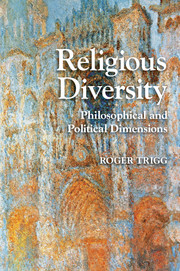Book contents
- Frontmatter
- Dedication
- Contents
- Introduction
- 1 The Challenge of Religious Diversity
- 2 Do Religions Claim Truth?
- 3 Religious Pluralism
- 4 The Roots of Religious Belief
- 5 Does Disagreement Undermine Theism?
- 6 Education and Religious Diversity
- 7 Truth and Coercion
- 8 Religious Diversity and Identity
- 9 Religion as Personal Preference
- 10 Freedom and Religion
- Bibliography
- Index
- References
1 - The Challenge of Religious Diversity
Published online by Cambridge University Press: 05 June 2014
- Frontmatter
- Dedication
- Contents
- Introduction
- 1 The Challenge of Religious Diversity
- 2 Do Religions Claim Truth?
- 3 Religious Pluralism
- 4 The Roots of Religious Belief
- 5 Does Disagreement Undermine Theism?
- 6 Education and Religious Diversity
- 7 Truth and Coercion
- 8 Religious Diversity and Identity
- 9 Religion as Personal Preference
- 10 Freedom and Religion
- Bibliography
- Index
- References
Summary
THE PROBLEM OF DIVERSITY
The contemporary world echoes with such phrases as “celebrating diversity.” As contact between even previously remote parts of the world increases, we cannot fail to be aware of the great diversity of belief and practice that exists around the world in all areas of human life. Modern technology can ensure that even tribes in New Guinea can see what is happening at that moment in New York. The increase of air travel between continents enables all of us to become tourists in every part of the globe, and many to move their homes and jobs to countries of which a few years ago they may not even have heard. There is migration from one European country to another, even though in living memory those countries may have been at war with each other, or at least totally isolated from each other's way of life. Barriers between Eastern and Western Europe set up after the Second World War have disappeared.
All this is commonplace, although it gives sociologists plenty of material on which to build theories about “globalization.” None of us can live in hermetically sealed societies, assuming that our way of life is not only the best way but the only way. Differing ways of life compete for our attention even in the same place. In such a ferment of change, most people on the top of a London bus may be speaking any language but English. There used to be a saying about “the man on the Clapham omnibus” meaning, a hundred years or so ago, the average person in the street. One could use such a mythical London figure to illustrate “ordinary,” “normal” reactions to whatever was under discussion. A short trip on any London bus today will quickly dispel any hope of distilling any common reaction to anything. Languages, cultures, and religions clash in merry profusion. All the people on the bus have in common is that they are in the same place at the same time. They are, of course, all human, and their share in a common human nature may not be a trivial issue. It may provide them all with a commonality on which all else is built. We will return to that. Nevertheless the immediate impact is the fact of difference and diversity.
- Type
- Chapter
- Information
- Religious DiversityPhilosophical and Political Dimensions, pp. 4 - 22Publisher: Cambridge University PressPrint publication year: 2014
References
- 1
- Cited by



